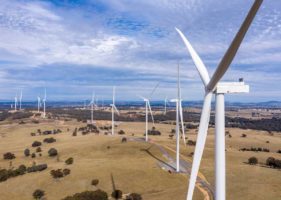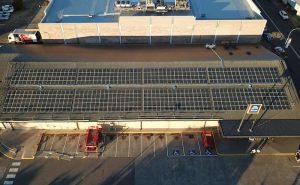Allegations of fraud and a lack of integrity within Australia’s primary carbon offset scheme have been referred to the Commonwealth Auditor General for investigation, after a whistleblower labelling the offsets regime a “fraud on the environment”.
The referral, made by The Australian Greens, comes after the former chair of the Emissions Reduction Assurance Committee, professor Andrew Macintosh, turned whistle-blower and claimed there are serious and unresolved flaws in the methodologies used to issue Australian Carbon Credit Units (ACCUs).
Macintosh, who now works for the Australian National University, served as the chair of the Emissions Reduction Assurance Committee for six-and-a-half years, the body responsible for verifying the integrity of the carbon offset methods.
On Thursday, Macintosh said that many of the methods signed off by the committee “suffer from a distinct lack of environmental integrity” and that the federal government’s Emissions Reduction Fund – established to purchase offsets on behalf of Australian taxpayers – amounted to an “environmental and taxpayer fraud”.
“All of the major emission reduction methods have serious integrity issues, either in their design or the way they are being administered,” Macintosh said.
“People are getting ACCUs for not clearing forests that were never going to be cleared; they are getting credits for growing trees that are already there; they are getting credits for growing forests in places that will never sustain permanent forests; and they are getting credits for operating electricity generators at large landfills that would have operated anyway.”
Greens leader Adam Bandt has sought to have the claims investigated by the federal government watchdog.
“This climate fraud must be fully and independently investigated,” Bandt said.
“When the former head of the government’s Emissions Reduction Assurance Committee reveals that the carbon credits scheme is ‘largely a scam’, we need an open transparent inquiry with powers to get to the bottom of it.”
“This is a critical issue. Both the Morrison Government and Labor are claiming to take climate seriously while planning to open up 114 new coal and gas projects, relying on permits and offsets to cover up their duplicity. If carbon credits are fraudulent too, then Australia will definitely blow its climate targets.”
The federal government has promoted ACCUs as a ‘high integrity’ form of carbon offset, and they have generally attracted much higher prices than many of the offset units that can be purchased overseas.
ACCUs also underpin the operation of the Morrison government’s flagship climate policy, the $4.5 billion Emissions Reduction Fund, through which the federal government has contracted to purchase almost 230 million of the ACCU units that are now having their integrity questioned.
In a statement, federal energy and emissions reduction minister Angus Taylor rejected the suggestions of fraud, and defended the operation of the Emissions Reduction Fund (ERF), claiming the criticism was politically motivated.
“This is the latest in a long line of politically motivated attacks on the ERF by left-wing politicians and groups like The Australia Institute,” Taylor said.
“First, they said the ERF wouldn’t deliver any abatement. Then they said Australia would miss its 2020 target despite the ERF. Now the ERF has been an overwhelming success, they’re claiming the abatement isn’t real.”
“The fact is, the ERF is the world’s largest and most successful national offset scheme. The ERF has more than 1,100 projects, delivered 17 million tonnes of abatement in 2021 and is forecast to contribute at least 213 million tonnes of abatement towards Australia’s 2030 Paris target.”
Macintosh has published new analysis, prepared with other carbon market experts at the ANU, which has called for the breaking up of the Clean Energy Regulator, the body responsible for issuing ACCUs and administration of the Emissions Reduction Fund, as part of a potential solution to the integrity issue.
The research recommends the federal government considers the immediate repeal the low integrity offset methods and stopping the further issuance of further ACCUs under those methods.
Speaking with ABC Radio National on Thursday, chair of the Clean Energy Regulator, David Parker, also rejected the findings of the research.
“[The Clean Energy Regulator] commissioned some much more sophisticated research than Andrew and his colleagues had done, which did use all the data highly sophisticated by world leading analysis,” Parker told the ABC.
“It was peer reviewed, and it’s in the public domain. And that research showed that the conclusions in their early research didn’t stack up.”
While Parker said the results of the regulator’s analysis was made public, he said that it was not possible for the data underpinning the analysis to be published, citing legal reasons.
Just over 100 million ACCUs have been issued to date, the vast majority of which have been created under just a handful of carbon offset methodologies.
Many of these include offsets have been awarded for the revegetation of native forests and the destruction of methane gas produced from landfills.
The largest category – avoided deforestation – sees landholders awarded carbon credits simply for committing to not clear their land of trees.
The Emissions Reduction Assurance Committee recently signed off on a new methodology that would allow carbon capture and storage projects to claim carbon offset units.
Macintosh said that most of the Australian carbon offsets units issued to date did not represent a genuine reduction in Australia’s emissions.
“The available data suggests 70 to 80 per cent of the ACCUs issued to these projects are devoid of integrity – they do not represent real and additional abatement,” professor Macintosh said.
“What is occurring is a fraud on the environment, a fraud on taxpayers and a fraud on unwitting private buyers of ACCUs, including private households who purchase ACCUs to offset their personal emissions.”
“By issuing ACCUs for these low integrity abatement projects, the regulator is throwing good money after bad and undermining Australia’s ability to meet its long-term emission reduction targets,” Macintosh added.
The revelations coincide with the release of new research from progressive think tank The Australia Institute, which raises additional, serious, questions about potential conflicts of interest amongst the current members of the Emissions Reduction Assurance Committee.
The report finds that several of the committee’s current members are currently employed by organisations with interests in carbon capture and storage technologies or have previous links to the fossil fuel industry.
The current chair of the committee, David Byers, was previously the interim and deputy CEO of the Minerals Council of Australia.
The committee’s membership also includes Brian Fisher of BAEconomics, who the Morrison government engaged to produce policy modelling used to attack the Labor opposition in the lead up to the 2019 federal election.
“It is critical that the organisations responsible for overseeing these schemes are independent and credible – both in perception and in fact – to ensure the veracity of any net-zero claim,” the Australia Institute’s climate and energy program director, Richie Merzian, said.
“The independence of both the CER and ERAC is now in question, casting doubt over the integrity of the whole Emissions Reduction Fund.”
“The Climate Change Authority called for an audit of the governance of the Clean Energy Regulator in 2020. This should go ahead as a matter of urgency,” Merzian added.
The Australia Institute made no allegation of illegality on the part of the membership of the Emissions Reduction Assurance Committee.
The Clean Energy Regulator has been contacted for additional comment.









